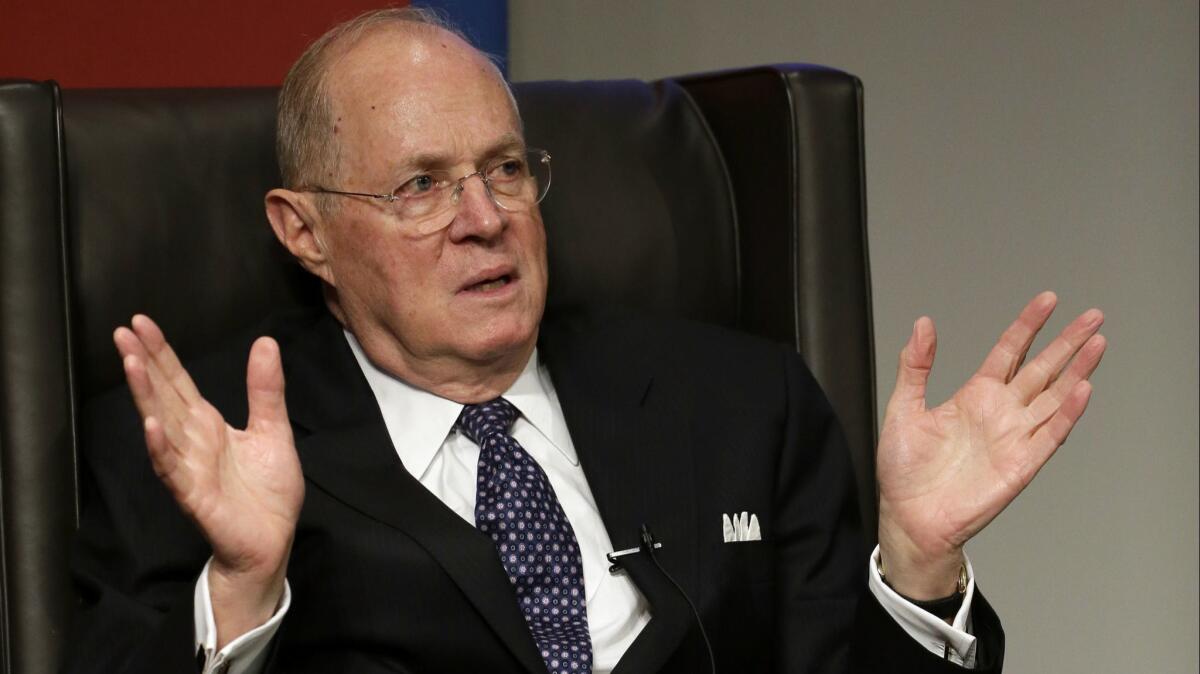Op-Ed: Kennedy’s final opinion was a last stand for the decent Republican Party that put him on the Supreme Court

- Share via
We now know that Justice Anthony M. Kennedy’s concurrence in the travel ban case, Trump vs. Hawaii, was a valediction. But a valediction for what?
In the final opinion of his 30-year Supreme Court tenure, and his 43-year federal judicial career, Kennedy made two main points as he added nuance to the court’s decision that President Trump has wide latitude to bar citizens from entering the United States.
The first was to note that government officials can and do violate the Constitution even in instances in which rules of “justiciability” (which govern when the courts can intervene to correct a constitutional wrong) do not provide for a judicial remedy. Indeed, wrote Kennedy, “the very fact that an official may have broad discretion, discretion free from judicial scrutiny, makes it all the more imperative for him or her to adhere to the Constitution and to its meaning and its promise.”
There is little doubt that this admonition (as a onetime Kennedy clerk, I am confident the justice wrote every word of the concurrence himself, longhand) was a pointed reaction to President Trump’s assertion of autocratic and essentially unlimited executive power in areas where the law does not allow the judiciary to hold him back.
Kennedy will perhaps stand first among modern Justices in his desire to be an ambassador for the Constitution around the world.
Trump has essentially asserted he is king where the pardon power is concerned, and that he is incapable of obstructing justice. Kennedy, whose reverence for the rule of law is a defining tenet, could only regard such a wrongheaded view with alarm and disdain.
On Tuesday, in the Trump vs. Hawaii concurrence, Kennedy’s opinion looked like a warning shot to the president not to press his luck with his absolutist views. On Wednesday, after Kennedy announced his retirement, it read like a parting expression of hope to his suddenly ex-colleagues to hold the line if and when the time comes.
Kennedy’s second point was an entreaty about the country’s conduct of foreign affairs, which plainly reflected his aversion to the gruesome spectacle that has been broadcast across the world of the United States’ separating parents and children at the U.S.-Mexico border.
“An anxious world must know that our Government remains committed always to the liberties the Constitution seeks to preserve and protect,” he wrote, “so that freedom extends outward, and lasts.”
This plea might seem toothless given that he joined the court’s decision deferring to Trump’s mean-spirited travel ban. Yet there should be no doubt that Kennedy means it to his bones.
Kennedy will perhaps stand first among modern Justices in his desire to be an ambassador for the Constitution around the world. It is the flip side of his propensity — controversial in some quarters — to consult foreign law to aid the court’s understanding of basic liberties. (See Roper vs. Simmons, holding that the Constitution forbids the execution of persons for crimes they committed when they were under 18.)
There is also a broader historical aspect to Kennedy’s legacy and his idealistic vision of the Constitution’s reach and influence. He was an appointee of President Reagan, who worked a sea change in the composition and viewpoint of the federal courts. After 35 years, that era on the court is at an end.
Enter the Fray: First takes on the news of the minute from L.A. Times Opinion »
The change is not just a matter of personnel. Reagan famously advanced a “city on a hill” vision of the United States — America as a beacon of hope for the world. Reagan’s opponents viewed his position as false piety shilling for a hard-right conservatism, but his supporters believed in it wholeheartedly. And Kennedy, a lifelong California Republican, represented it on the bench: He was dedicated to civic virtue, decency and toleration. Those bedrock values generated many of the noteworthy Kennedy decisions that will be lionized in coming days.
Such wholesome qualities look quaint in the Age of Trump, who views them as the precepts of suckers and losers. Trump’s foreign policy, and the failure of Congressional Republicans to push back against it, have committed the former party of Reagan to a mean-spirited, pessimistic nativism. We have gone from “Mr. Gorbachev, tear down that wall” to “Mexico must build the wall and pay for it to keep its rapists and criminals beyond our borders.”
Kennedy’s valediction — his insistence on limits, his care in underlining them — serves as a kind of farewell to the political culture and to the Republican Party that brought him to the court. There’s an embedded hope in the concurrence for a return to decency and cosmopolitanism, but for the time being, it’s the hope of one citizen among millions, with no further power to help realize it, and at least in the near future scant basis to think it will happen.
Harry Litman teaches constitutional law at UC San Diego. He clerked for Justice Anthony M. Kennedy during the 1988-89 Supreme Court term.
Follow the Opinion section on Twitter @latimesopinion and Facebook
More to Read
A cure for the common opinion
Get thought-provoking perspectives with our weekly newsletter.
You may occasionally receive promotional content from the Los Angeles Times.









